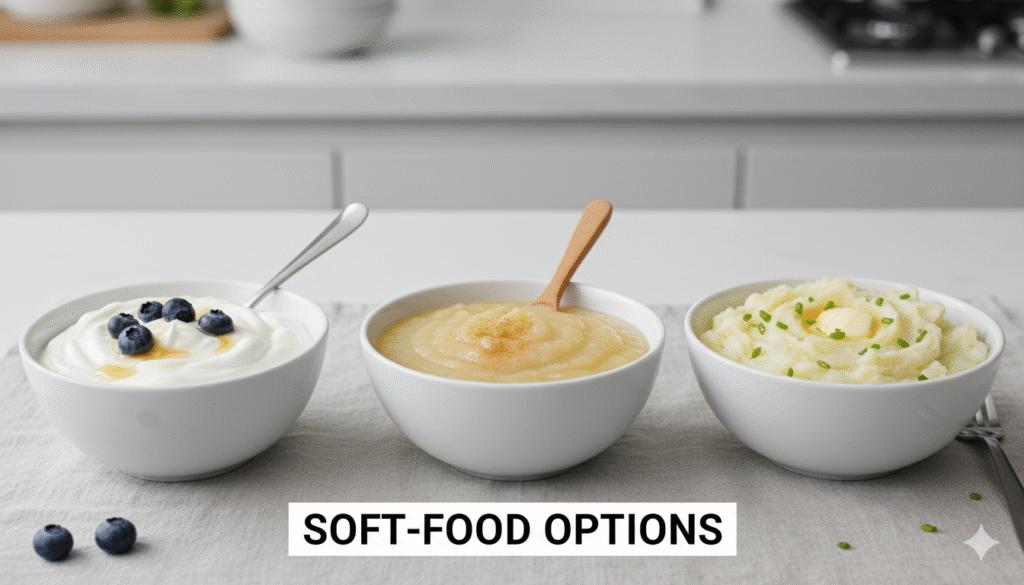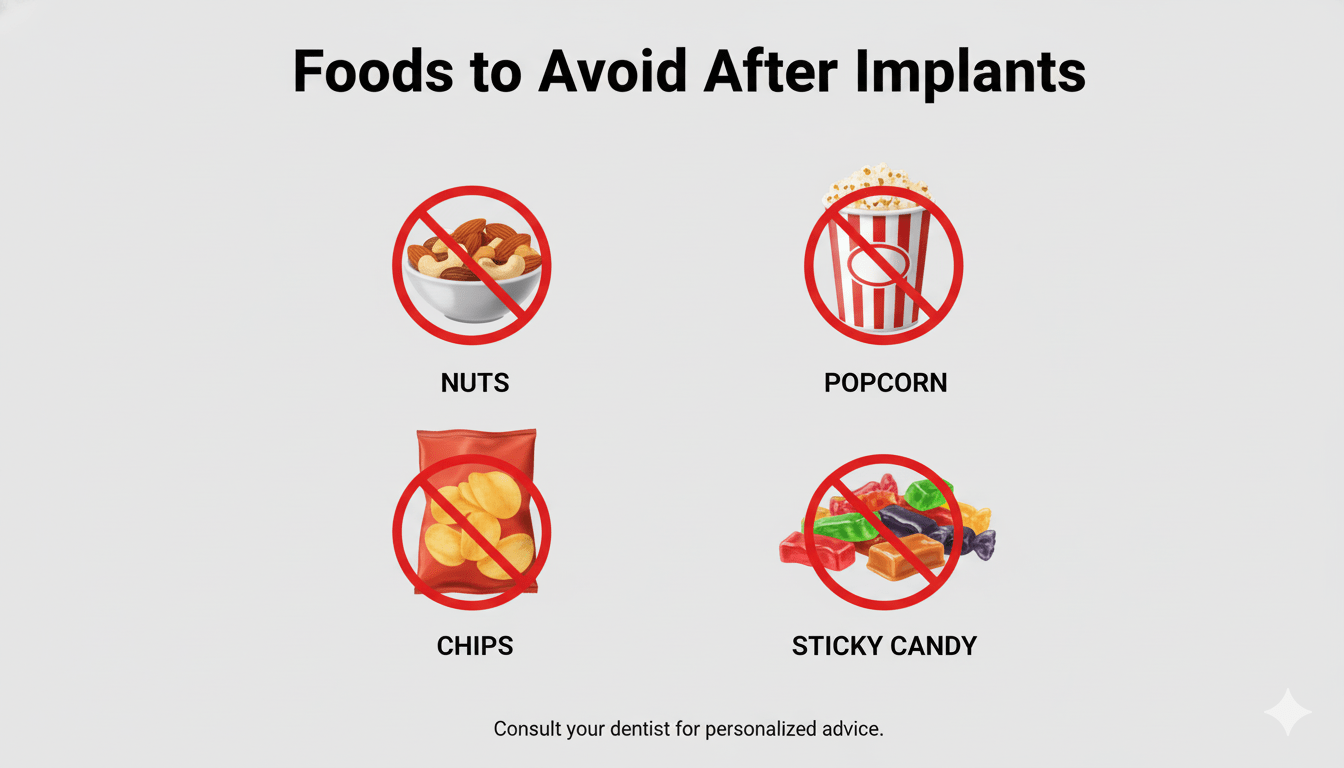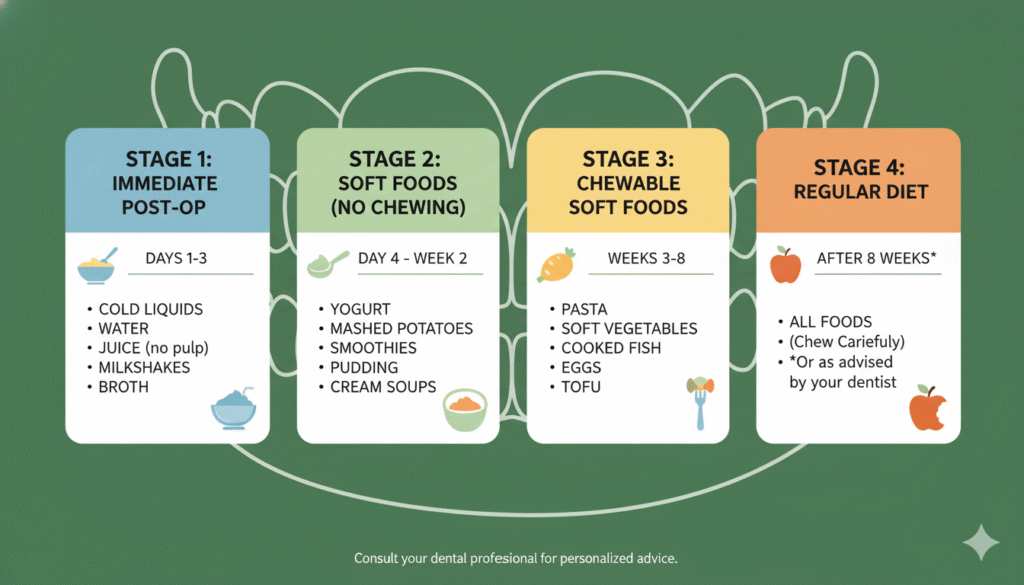Dental Implants and Nutrition: Foods to Eat & Avoid (Full Guide)
Dental implants are one of the most reliable and long-lasting solutions for missing teeth. But what many people do not realize is that nutrition plays a huge role in how well your implant heals — especially during the first few weeks.
Whether you just had an implant placed or you are preparing for the procedure, understanding what to eat (and what to avoid) can make your recovery smoother, faster, and more comfortable.
This detailed guide explains:
✔ What to eat after dental implant surgery
✔ Foods to avoid
✔ Stages of healing and matching diets
✔ How nutrition affects bone integration
✔ Supplements and helpful nutrients
✔ A day-by-day meal guide
✔ Expert-level FAQs
Let’s get started.
Why Nutrition Matters After Dental Implants
Dental implants must go through a process called osseointegration, where the implant fuses with your jawbone. This stage determines whether:
- The implant becomes stable
- The area heals properly
- You avoid complications like infection or implant failure
Your diet directly affects this healing process. Eating the right foods helps:
- Reduce inflammation
- Promote bone growth
- Protect stitches and implant sites
- Maintain oral hygiene
- Avoid damaging pressure on the implant
Foods You Can Eat After Dental Implant Surgery
Here is your detailed, dentist-recommended list of soft, healing-friendly foods.
1. Soft & Smooth Foods (First 48–72 hours)
During this period, the goal is zero chewing. Soft foods reduce pressure on the implant area.
Best options:
- Yogurt (plain or Greek)
- Mashed potatoes
- Applesauce
- Smoothies (avoid seeds)
- Pudding or custard
- Meal replacement shakes
- Broths and clear soups
Tip: Keep all foods lukewarm — not hot — to avoid irritating the gums.

2. High-Protein Foods
Protein is essential for tissue repair and bone healing. Choose soft sources such as:
- Scrambled eggs
- Cottage cheese
- Greek yogurt
- Protein shakes
- Soft tofu
- Moist, flaky fish (after 3–4 days)
Protein goal: 60–80+ grams per day (ask your dentist if unsure).
3. Nutrient-Rich Soups & Stews
Soups keep you hydrated and provide vitamins needed for healing.
Best choices:
- Lentil soup
- Bone broth
- Vegetable-puree soup
- Chicken broth
Avoid chunky soups early on.
4. Soft Fruits & Vegetables
These give your body antioxidants that reduce inflammation.
Great options:
- Bananas
- Avocado
- Steamed carrots
- Pureed pumpkin or squash
- Mashed berries (without seeds)
Tip: Always avoid fruits with small seeds early on.
5. Healthy Carbohydrates
Carbs give energy needed for recovery.
Eat:
- Oatmeal
- Soft pancakes
- Mashed sweet potato
- White rice or overcooked soft rice
- Soft pasta
6. Hydrating Beverages
Hydration helps tissue repair and prevents dry mouth.
Drink:
- Water
- Coconut water
- Herbal teas
- Milk
- Smoothies (seedless)
Avoid straws — the suction can dislodge blood clots.
Foods to Avoid After Dental Implants
Some foods can irritate the implant area, slow healing, or cause infection.
1. Crunchy or Hard Foods
These can hit the implant site and cause injury.
Avoid:
- Nuts
- Popcorn
- Chips
- Raw carrots
- Hard bread and crusts
2. Sticky Foods
Sticky food can pull on the implant site or stick to sutures.
Avoid:
- Caramel
- Chewing gum
- Sticky candy
3. Spicy Foods
These may irritate your healing gums.
Avoid:
- Hot sauces
- Spicy curries
- Chili flakes
4. Acidic Foods
They may cause discomfort or slow healing.
Avoid:
- Citrus fruits (lemons, oranges)
- Tomato sauce
- Vinegar-based items
5. Alcohol & Smoking
Alcohol can affect healing, and smoking increases the risk of implant failure.
Avoid completely for at least 72 hours, preferably longer.

Healing Timeline: What to Eat at Each Stage
Here is a professionally aligned timeline explaining what you can eat at each phase of recovery.
Stage 1: First 48–72 Hours
Goal: No chewing, reduce swelling
Eat:
- Yogurt
- Smoothies
- Soups
- Applesauce
- Mashed potatoes
Avoid:
- Hot foods
- Spicy foods
- Straws
Stage 2: Days 4–7
Goal: Increase nutrition, soft chewing only
Eat:
- Scrambled eggs
- Soft pasta
- Mashed sweet potato
- Soft fish
- Oatmeal
- Cottage cheese
Avoid:
- Crunchy foods
- Seeds
Preventive Health Insurance: Why Every Athlete Needs It in 2025
Stage 3: Weeks 2–4
Goal: Transition slowly to regular foods
Eat:
- Soft chicken
- Rice
- Overcooked vegetables
- Bread without crust
Avoid:
- Hard meats
- Raw vegetables
Stage 4: After 6 Weeks
At this stage, most patients can return to normal foods, but confirm with your dentist.

Important Nutrients for Implant Healing
The right nutrients help bone and gum tissue recover.
1. Vitamin C
Helps collagen formation for gum healing.
Sources:
- Strawberries
- Kiwi
- Soft cooked broccoli
- Smoothies
2. Calcium & Vitamin D
Essential for bone integration.
Sources:
- Milk
- Yogurt
- Fortified foods
- Soft cooked kale
- Vitamin D exposure from sunlight
3. Omega-3 Fatty Acids
Reduce inflammation naturally.
Sources:
- Soft fish (salmon, cod)
- Omega-3 supplements (if approved by a dentist)
4. Protein
Most important for tissue repair.
Sources:
- Eggs
- Dairy products
- Protein shakes
Sample 7-Day Meal Plan After Dental Implants
Here is a simple, soft-food-friendly meal plan.
Day 1–2
- Breakfast: Yogurt & mashed banana
- Lunch: Pureed vegetable soup
- Dinner: Mashed potatoes + broth
- Snack: Protein shake
Day 3–4
- Breakfast: Oatmeal + honey
- Lunch: Soft scrambled eggs
- Dinner: Lentil soup
- Snack: Avocado mashed
Day 5–7
- Breakfast: Soft pancakes
- Lunch: Soft rice + steamed vegetables
- Dinner: Flaky baked fish
- Snack: Cottage cheese
Extra Tips for Faster Healing
- Maintain gentle oral hygiene using warm saltwater rinses (after 24 hours).
- Avoid brushing the implant area for a few days.
- Do not smoke — it slows bone healing.
- Keep food on the opposite side of the implant.
- Follow all dentist instructions closely.
Frequently Asked Questions (FAQs)
1. How long after dental implants can I eat normally?
Most people can return to normal eating in 6–8 weeks, depending on healing and dentist advice.
2. Can I drink coffee after dental implant surgery?
Yes, but only lukewarm coffee. Avoid hot coffee for 48–72 hours.
3. Is it okay to drink through a straw?
No. Suction may dislodge the healing blood clot.
4. When can I eat meat again?
Soft meats like fish can be eaten after 4–5 days. Hard meats should be avoided for several weeks.
5. What foods help implants heal faster?
- Greek yogurt
- Eggs
- Salmon
- Smooth soups
- Mashed vegetables
- Foods rich in Vitamin C and protein
External Resources (Trusted Sources)
- American Academy of Implant Dentistry — Patient Guide
- Mayo Clinic: Dental Implant Overview
- Cleveland Clinic: Dental Implant Aftercare
- ADA (American Dental Association) — Oral Surgery Care Tips
(All are safe and non-diagnostic references.)
Final Thoughts
Eating the right foods after dental implant surgery isn’t just about comfort — it’s a key part of ensuring your new implant lasts long, heals properly, and feels natural.
Stick to soft, nutritious foods, avoid crunchy or sticky items, and follow your dentist’s instructions for the best results.
